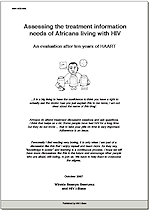Assessing the treatment information needs of Africans living with HIV (2007)
16 October 2007. Related: Archive.
 Download PDF 279 Kb
Download PDF 279 Kb
This was commissioned by HIV i-Base from Winnie Ssanyu Sseruma to understand the needs of HIV-positive Africans living in the UK, evaluate our existing publications and services and inform future strategy.
By assessing and analysing the treatment information needs of HIV positive Africans in the UK we wanted to find ways to address these needs in our future programme.
62 African men and women participated in 5 focus groups in London and Luton.
Main issues
- There is enough printed HIV treatment information, but the language is too scientific and difficult to understand.
- There are people within African communities who cannot read.
- A significant number of African people living with HIV cannot take HIV information home, or cannot be seen reading it for fear of disclosing their status.
- Many Africans prefer to get treatment information through discussions and workshops. The few treatment forums available are irregular and inflexible. They rarely meet the needs of mothers with young children.
- There are too few African treatment advocates able to help raise the level of treatment literacy in African communities.
- Peer advocacy, rather than professional healthcare services, play a key role in reducing stigma and isolation, and removing barriers to information.
Recommendations
- Exisiting printed HIV information should be reviewed to see whether it can be improved to accommodate the needs of Africans. A first step is to ensure that information is in plain, non-technical language.
- Translating HIV treatment information into key African languages should be considered.
- Investment in treatment discussions and workshops would address the issues of Africans who find reading English difficult or for whom owning printed materials is problematic.
- A training programme for African treatment advocates would build capacity to run discussions and workshops.
Acknowledgements
This project was made possible by a grant from Lloyds TSB Foundation for England and Wales. i-Base would like to thank everyone who was involved in making this project a reality. We would like to acknowledge the African HIV community based organisations that facilitated our work by allowing us to talk to their clients about the project as well as participate in the focus groups.
We would further like to extend our gratitude to the liaison staff of these organisations that helped set up the groups, Mark McPherson for supervising the project and Winnie Ssanyu Sseruma for facilitating the focus groups.
But most importantly, our special thanks goes to the focus group participants without whose input this project would not have happened.
This report is published as a supplement to HIV Treatment Bulletin.
